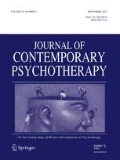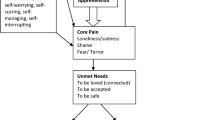Abstract
Generalized anxiety disorder (GAD) is a severely debilitating disorder characterized by high comorbidity and a negative impact on overall well-being. Cognitive-behavioral therapy (CBT) is the most recognized psychological treatment of GAD. Although CBT is well-established, it is also shown that not all clients benefit from it. The goal of this paper is to highlight an emerging model of working with GAD patients from the perspective of emotion-focused therapy. It is comparable to mainstream CBT theories in so far as it proposes that the client is not avoidant of emotional experience or of its processing in general, but rather, that it is specific triggers that the client is afraid of. Contrary to mainstream CBT theories, change is not facilitated through emotional habituation to difficult triggers (or emotions), but rather through the restructuring and transformation of problematic emotion schemes through a sequence of emotional processing steps. These steps include overcoming emotional avoidance, differentiation of, and staying with, core painful feelings (such as loneliness/sadness, shame, and terror/fear), articulation of the unmet needs contained in those feelings and the expression of an emotional response to those feelings/needs, typically compassion and healthy, boundary setting, protective anger. A case illustration is provided.

Similar content being viewed by others
References
American Psychiatric Association [APA]. (2013). Diagnostic and statistical manual of mental disorders (DSM-5) (5th ed.). Washington: American Psychiatric Association.
Behar, E., Dobrow DiMarco, I., Hekler, E. B., Mohlman, J., & Staples, A. M. (2009). Current theoretical models of generalized anxiety disorder (GAD): Conceptual review and treatment implications. Journal of Anxiety Disorders, 23, 1011–1023. doi:10.1016/j.janxdis.2009.07.006.
Borkovec, T. D., Alcaine, O. M., & Behar, E. (2004). Avoidance theory of worry and generalized anxiety disorder. In R. G. Heimberg, C. L. Turk, & D. S. Mennin (Eds.), Generalized anxiety disorder: Advances in research and practice (pp. 77–108). New York: Guilford Press.
Carter, R. M., Wittchen, H.-U., Pfister, H., & Kessler, R. C. (2001). One-year prevalence of subthreshold and threshold DSM-IV generalized anxiety disorder in a nationally representative sample. Depression and Anxiety, 13, 78–88. doi:10.1002/da.1020.
Cassidy, J., Lichtenstein-Phelps, J., Sibrava, N. J., Thomas, C. L., & Borkovec, T. D. (2009). Generalized anxiety disorder: Connections with self-reported attachment. Behavior Therapy, 40, 23–38. doi:10.1016/j.beth.2007.12.004.
Crits-Christoph, P., Connolly Gibbons, M. B., & Crits-Christoph, K. (2004). Supportive-expressive psychodynamic therapy. In R. G. Heimberg, C. L. Turk, & D. S. Mennin (Eds.), Generalized anxiety disorder: Advances in research and practice (pp. 294–319). New York: Guilford Press.
Crits-Christoph, P., Gibbons, M. B. C., Narducci, J., Schamberger, M., & Gallop, R. (2005). Interpersonal problems and the outcome of interpersonally oriented psychodynamic treatment of GAD. Psychotherapy: Theory, Research, Practice, Training, 42, 211–224. doi:10.1037/0033-3204.42.2.211.
Cuijpers, P., Sijbrandij, M., Koole, S., Huibers, M., Berking, M., & Andersson, G. (2014). Psychological treatment of generalized anxiety disorder: A meta-analysis. Clinical Psychology Review, 34, 130–140. doi:10.1016/j.cpr.2014.01.002.
Dugas, M. J., & Robichaud, M. (2007). Cognitive-behavioral treatment for generalized anxiety disorder. New York: Routledge.
Elliott, R. (2013). Person-centered/experiential psychotherapy for anxiety difficulties: Theory, research and practice. Person-Centered & Experiential Psychotherapies, 12, 16–32. doi:10.1080/14779757.2013.767750.
Elliott, R., Watson, J. C., Goldman, R. N., & Greenberg, L. S. (2004). Learning emotion-focused therapy: The process-experiential approach to change. Washington: American Psychological Association.
First, M. B., Spitzer, R. L., Gibbon, M., & Williams, J. B. W. (1997). Structured clinical interview for DSM-IV axis-I disorders (SCID-I): Clinician version. Washington: American Psychiatric Press.
Goldman, R. N., & Greenberg, L. S. (2014). Case formulation in emotion-focused therapy: Co-creating clinical maps for change. Washington: American Psychological Association.
Goldman, R., Greenberg, L., & Angus, L. (2006). The effects of adding emotion-focused interventions to the therapeutic relationship in the treatment of depression. Psychotherapy Research, 16, 537–549. doi:10.1080/10503300600589456.
Greenberg, L. S. (2011). Emotion-focused therapy. Washington: American Psychological Association.
Greenberg, L. S., Rice, L. N., & Elliott, R. (1993). Facilitating emotional change: The moment by moment process. New York: Guilford Press.
Greenberg, L. S., & Watson, J. (1998). Experiential therapy of depression: Differential effects of client-centred relationship conditions and process-experiential interventions. Psychotherapy Research, 8, 210–224. doi:10.1093/ptr/8.2.210.
Greenberg, L. S., & Watson, J. (2006). Emotion-focused therapy for depression. Washington: American Psychological Association.
Hanrahan, F., Field, A. P., Jones, F. W., & Davey, G. C. (2013). A meta-analysis of cognitive therapy for worry in generalized anxiety disorder. Clinical Psychology Review, 33, 120–132. doi:10.1016/j.cpr.2012.10.008.
Hunot, V., Churchill, R., Teixeira, V., Silva de Lima, M. (2007). Psychological therapies for generalised anxiety disorder. Cochrane Database of Systematic Reviews, (1), CD001848. doi:10.1002/14651858.CD001848.pub4.
Keogh, D., Timulak, L., & McElvaney, J. (2014, June). Treating generalised anxiety disorder with emotion focused therapy: A case study investigation of emotional change processes. Paper presented at the Annual Meeting of the Society for Psychotherapy Research, Copenhagen, Denmark.
Kessler, R. C., Berglund, P., Demler, O., Jin, R., Merikangas, K. R., & Walters, E. E. (2005a). Lifetime prevalence and age-of-onset distributions of DSM-IV disorders in the National Comorbidity Survey Replication. Archives of General Psychiatry, 62, 593–602. doi:10.1001/archpsyc.62.6.593.
Kessler, R. C., Chiu, W., Demler, O., & Walters, E. E. (2005b). Prevalence, severity, and comorbidity of 12-month DSM-IV disorders in the national comorbidity survey replication. Archives of General Psychiatry, 62, 617–627. doi:10.1001/archpsyc.62.6.617.
King, M., Sibbald, B., Ward, E., Bower, P., Lloyd, M., Gabbay, M., & Byford, S. (2000). Randomised controlled trial of non-directive counselling, cognitive-behaviour therapy and usual general practitioner care in the management of depression as well as mixed anxiety and depression in primary care. Health Technology Assessment, 4(19), 1–83.
McNally, S., Timulak, L., & Greenberg, L. S. (2014). Transforming emotion schemes in emotion focused therapy: a case study investigation. Person-Centered & Experiential Psychotherapies, 13, 128–149. doi:10.1080/14779757.2013.871573.
Mennin, D. S. (2004). Emotion regulation therapy for generalized anxiety disorder. Clinical Psychology & Psychotherapy, 11, 17–29. doi:10.1002/cpp.389.
Mennin, D. S., Fresco, D. M., Ritter, M., & Heimberg, R. G. (2015). An open trial of emotion regulation therapy for generalized anxiety disorder and co-occurring depression. Depression and Anxiety. doi:10.1002/da.22377.
National Institute for Health and Clinical Excellence. (2011). Generalised anxiety disorder and panic disorder (with or without agoraphobia) in adults: Management in primary, secondary and community care. London: NICE Clinical Guidelines 113.
Newman, M. G., Castonguay, L. G., Borkovec, T. D., Fisher, A. J., & Nordberg, S. S. (2008). An open trial of integrative therapy for generalized anxiety disorder. Psychotherapy, 45, 135–147. doi:10.1037/0033-3204.45.2.135.
Newman, M. G., & Llera, S. J. (2011). A novel theory of experiential avoidance in generalized anxiety disorder: A review and synthesis of research supporting a contrast avoidance model of worry. Clinical Psychology Review, 31, 371–382. doi:10.1016/j.cpr.2011.01.008.
Newman, M. G., Llera, S. J., Erickson, T. M., Przeworski, A., & Castonguay, L. G. (2013). Worry and generalized anxiety disorder: A review and theoretical synthesis of evidence on nature, etiology, mechanisms, and treatment. Annual Review of Clinical Psychology, 9, 275–297. doi:10.1146/annurev-clinpsy-050212-185544.
O’Brien, K., Timulak, L., McElvaney, J., & Greenberg, L.S. (2012, June). Emotion-focused case conceptualisation of generalised anxiety disorder. Paper presented at the 43rd Annual Meeting of the International Society for Psychotherapy research, Virginia Beach, USA.
Paivio, S. C., & Pascual-Leone, A. (2010). Emotion-focused therapy for complex trauma: An integrative approach. Washington: American Psychological Association.
Pascual-Leone, A. (2009). Emotional processing cycles in experiential therapy: “Two steps forward, one step backward”. Journal of Consulting and Clinical Psychology, 77, 113–126. doi:10.1037/a0014488.
Pascual-Leone, A., & Greenberg, L. S. (2007). Emotional processing in experiential therapy: Why “the only way out is through”. Journal of Consulting and Clinical Psychology, 75, 875–887. doi:10.1037/0022-006X.75.6.875.
Roemer, L., & Orsillo, S. M. (2014). An acceptance-based behavioral therapy for generalized anxiety disorder. In D. H. Barlow (Ed.), Clinical handbook of psychological disorders: A step-by-step treatment manual (pp. 206–236). New York: Guilford Press.
Rowell, L., Murphy, J., Timulak, L., & McElvaney, J. (2014, November). Addressing the worry process in EFT for GAD: Task analysis of the two-chair task. Paper presented at the conference of Psychological Society of Ireland, Kilkenny.
Shahar, B. (2014). Emotion-focused therapy for the treatment of social anxiety: An overview of the model and a case description. Clinical Psychology & Psychotherapy, 21, 536–547. doi:10.1002/cpp.1853.
Timulak, L., McElvaney, J., Martin, E. & Greenberg, L.S. (2014, June). Emotion-focused therapy for GAD: First quantitative and qualitative outcomes. Paper presented at the Annual Meeting of the Society for Psychotherapy Research, Copenhagen, Denmark.
Timulak, L., & Pascual-Leone, A. (2014). New developments for case conceptualization in emotion-focused therapy. Clinical Psychology & Psychotherapy. doi:10.1002/cpp.1922.
Timulak, L. (2015). Transforming emotional pain in psychotherapy: An emotion-focused approach. London: Routledge
Watson, J.C., & Goldman, R. N. (2012, July). Experiential perspectives on anxiety. Panel presented at the 10th Conference of the World Association for Person-Centered and Experiential Psychotherapy and Counseling. Antwerps, Belgium.
Watson, J. C., Gordon, L. B., Stermac, L., Kalogerakos, F., & Steckley, P. (2003). Comparing the effectiveness of process-experiential with cognitive-behavioral psychotherapy in the treatment of depression. Journal of Consulting and Clinical Psychology, 71, 773–781. doi:10.1037/0022-006X.71.4.773.
Wells, A. (2006). The metacognitive model of worry and generalized anxiety disorder. In G. C. L. Davey & A. Wells (Eds.), Worry and its psychological disorders: Theory, assessment and treatment (pp. 179–199). Chichester: John Wiley.
Wittchen, H. U. (2002). Generalized anxiety disorder: Prevalence, burden, and cost to society. Depression and Anxiety, 16, 162–171. doi:10.1002/da.1006.
Acknowledgments
This paper is based on a research project funded by the Health Research Board (Ireland), Grant H01388-HRA POR/2010/7.
Author information
Authors and Affiliations
Corresponding author
Rights and permissions
About this article
Cite this article
Timulak, L., McElvaney, J. Emotion-Focused Therapy for Generalized Anxiety Disorder: An Overview of the Model. J Contemp Psychother 46, 41–52 (2016). https://doi.org/10.1007/s10879-015-9310-7
Published:
Issue Date:
DOI: https://doi.org/10.1007/s10879-015-9310-7




